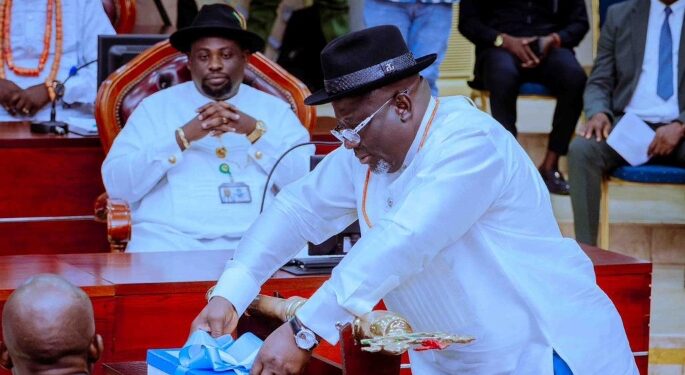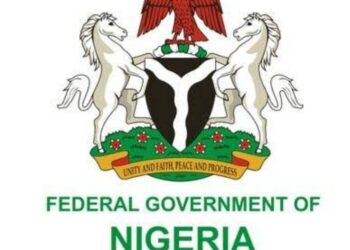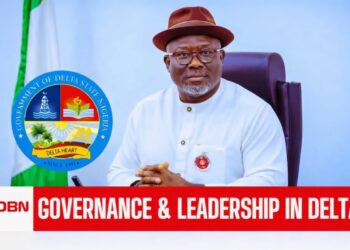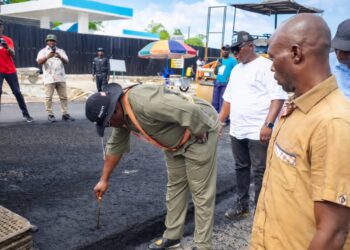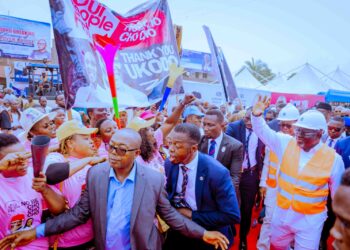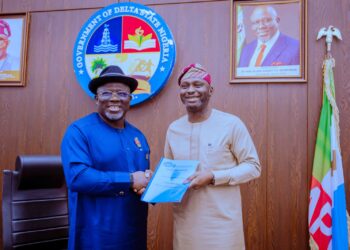By Oghenefejiro Emado
Delta State Governor, Sheriff Oborevwori, has presented a comprehensive N1.664 trillion Appropriation Bill for the 2026 fiscal year to the Delta State House of Assembly.
The budget, christened “Budget of Accelerating the More Agenda,” prioritizes capital expenditure, with a significant 70% allocation to drive infrastructure expansion and socio-economic development.
According to the governor, the budget is crafted against the backdrop of an improving national economy, with Nigeria’s GDP projected to grow by 3.9% in 2026.
He noted that rising oil revenues, stabilizing fiscal and monetary policies, tax reforms, and renewed federal efforts in tackling insecurity have rekindled hope for economic expansion and improved living standards.
The governor explained that the 2026 budget is designed to drive inclusive and sustainable growth, develop human capital, accelerate infrastructure renewal, enhance social cohesion, reduce debt exposure, and ensure better resource management.
He highlighted that the total budget size comprises N499 billion (30%) for recurrent expenditure and N1.165 trillion (70%) for capital projects, representing a 70% increase over the 2025 appropriation.
On revenue expectations, Governor Oborevwori stated that the state anticipates significant improvement in federal allocations following the removal of fuel subsidy.
Statutory Allocation, including mineral derivation, is projected at N720 billion, accounting for 43.28% of total revenue, reflecting a 23.75% rise from the previous year.
He also disclosed that ongoing reforms in Internally Generated Revenue (IGR) collection are expected to yield N250 billion in 2026, an 86.5% increase over 2025, driven by professionalized revenue processes and a broader tax net.
The governor emphasized that key sectors earmarked for priority funding in 2026 include Works, Education, Health, and Agriculture. Specifically, the Works Ministries (Urban Highways, and Rural and Riverine Roads) will jointly receive N450 billion to accelerate strategic road development across the state.
Education is allocated N105.086 billion to strengthen access to functional learning, while the health sector receives N50.067 billion to improve existing infrastructures across 441 primary healthcare centers, 65 general hospitals, and three tertiary facilities.
Additionally, the Delta State Capital Territory Development Agency is slated to receive N20 billion, with the governor reaffirming his commitment to addressing flooding and expanding urban infrastructure in Asaba.
A similar sum is allocated to the Warri, Uvwie, and Environs Development Agency, as massive road and flyover projects continue reshaping the oil city.
In the areas of agriculture, energy, and social protection, the proposed budget dedicates N10 billion to boost food security and agro-investment; N16 billion to strengthen electricity supply through the state’s upcoming multi-grid template; and N20 billion to scale up social intervention programs aimed at lifting more Deltans out of poverty.
Furthermore, N100 billion is reserved for direct interventions across all 25 local government areas, translating into an average of N4 billion each.
On security, the governor reiterated his administration’s resolve to deploy cutting-edge technology, including drones and advanced surveillance equipment, while continuing logistical and financial support to security agencies.
The governor commended the House for its partnership and urged members to expedite consideration and passage of the budget to sustain ongoing development momentum. He reaffirmed his administration’s commitment to building “a prosperous, secure, and stronger Delta where no one is left behind.”
The Speaker of the State House of Assembly, Emomotimi Guwor, praised the governor’s leadership, noting significant achievements under the MORE Agenda, including strategic flyovers, expanded road networks, improved healthcare facilities, strengthened education, and empowerment programs.
He assured the governor of the Assembly’s resolve to undertake a thorough and timely review of the appropriation bill, stressing that the Legislature remains committed to people-centered governance, accountability, and equitable development.

